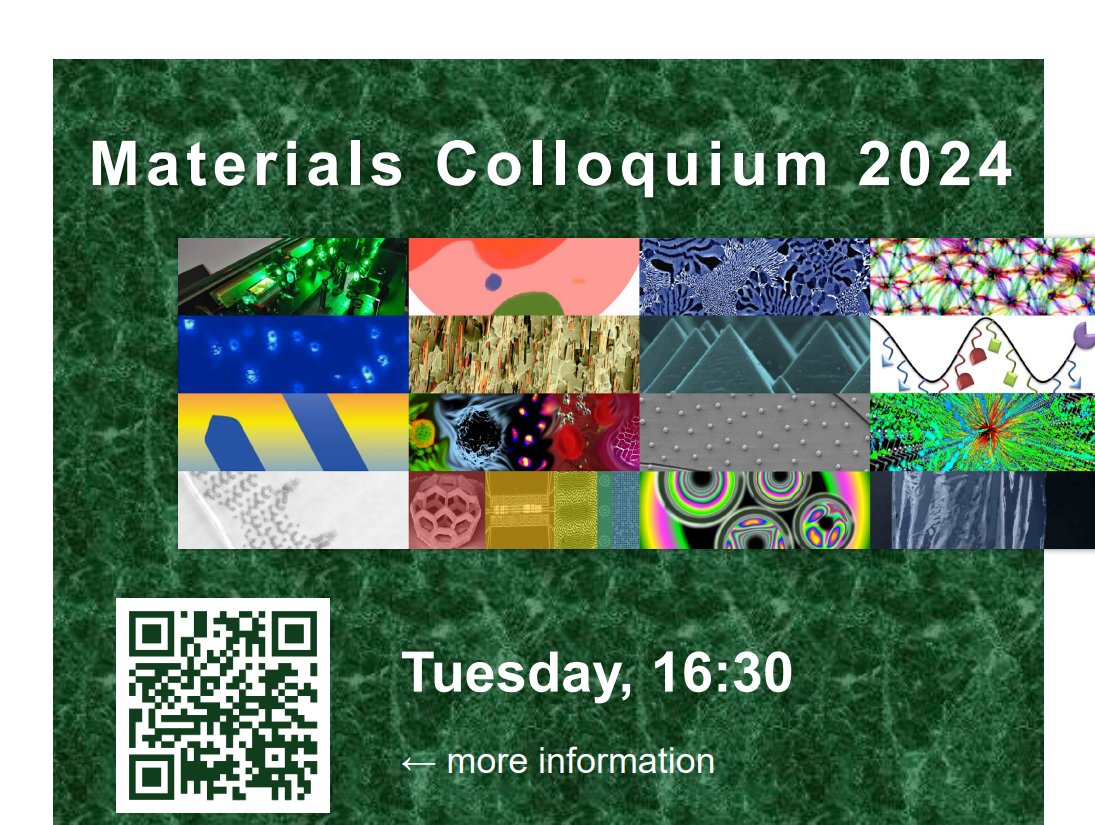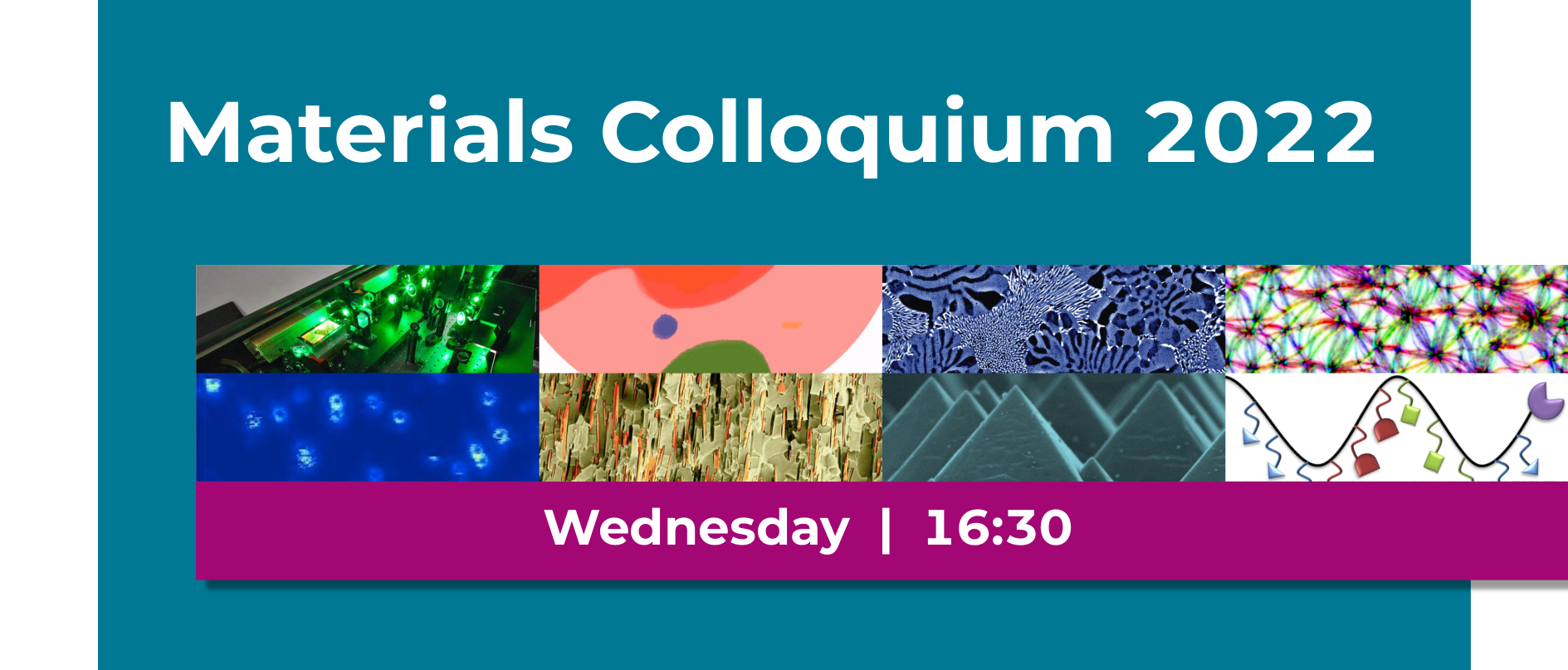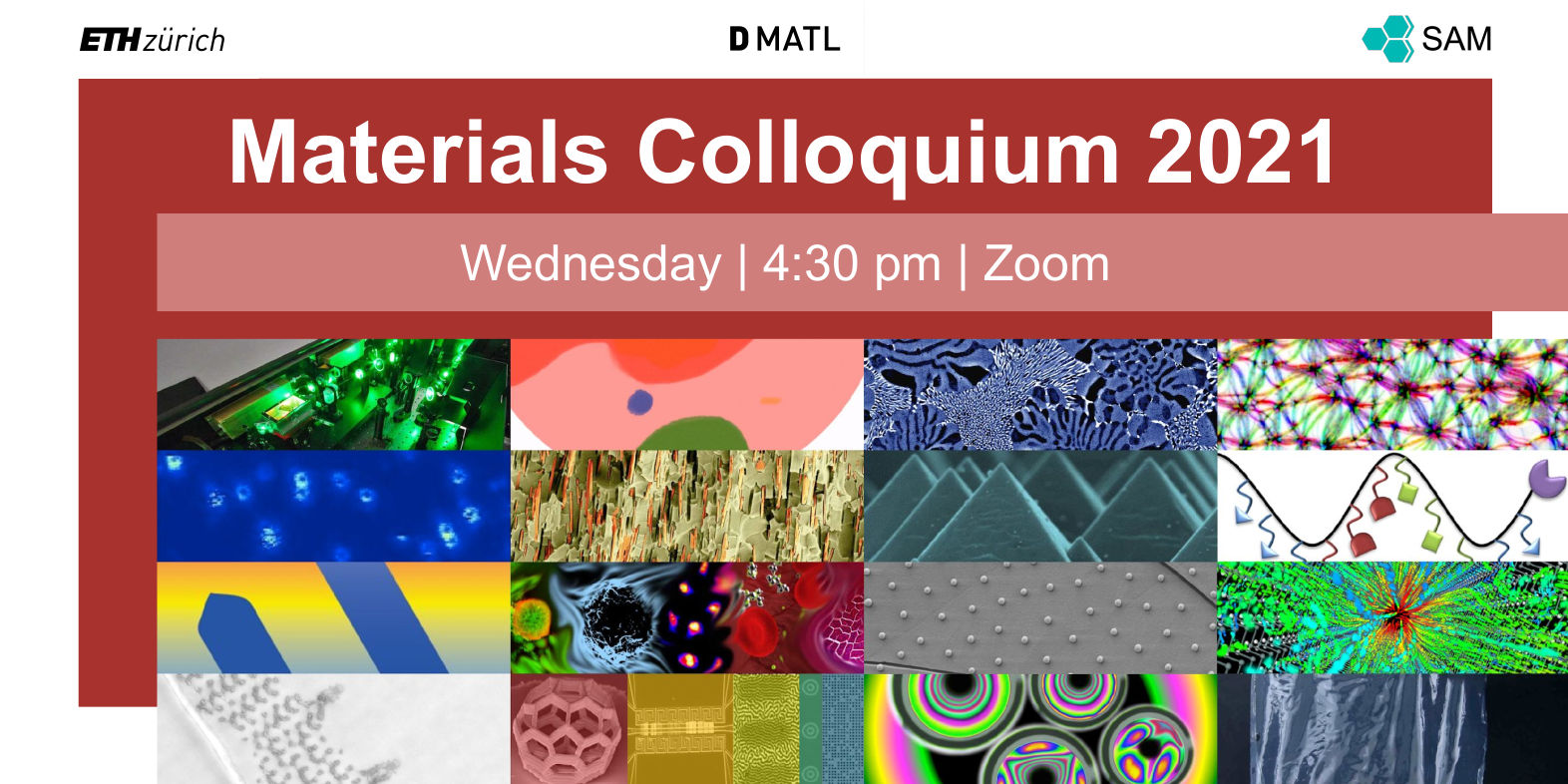Overview of all Materials Colloquia

Materials Colloquium 2025, December 4th
Lecture Hall HCI J6, 16:30 Tatiana Akhmetshina Laboratory for Metal Physics and Technology, ETH Zürich Smart Metals in Medicine: Designing Implants that Support and Disappear Millions of patients undergo secondary surgeries to remove permanent metal implants after fracture healing. Biodegradable magnesium alloys offer temporary support that dissolves safely in the body. Existing systems rely on […]

Materials Colloquium 2025, June 5th
Lecture Hall HCI J7, 16:30 Prof. Arkadiy Simonov Laboratory for Disordered Materials, ETH Zürich Gas Storage in Disordered Materials Gas storage materials are typically studied through average structure measurements, but this approach misses important structural changes during material activation and gas cycling. Using diffuse X-ray scattering on Prussian Blue materials – frameworks previously considered stable […]

Materials Colloquium 2025, May 8th
Lecture Hall HCI J6, 16:30 Dr. Jürgen Schawe Laboratory of Metal Physics, ETH Zürich Calorimetry on Atomic and Molecular Systems in the Millisecond Scale Conventional differential scanning calorimetry (DSC) is a standard technique for analyzing compounds and materials. It is a relatively fast, sensitive and easy-to-use method for detecting the occurrence of phase transformations and […]

Materials Colloquium 2025, April 3rd
Lecture Hall HCI J6 Dr. Sebastian Kahlert Office of ETH Sustainability, ETH Zürich ETH Sustainability and the ETH Net Zero Programme At ETH Zurich, we are working to significantly reduce our greenhouse gas emissions by 2030. ETH Net Zero is a task for which we are jointly responsible. The “ETH Net Zero” programme bundles impact-oriented […]

Materials Colloquium 2025, March 6th
Lecture Hall HCI J4 Dr. Hyun Suk Wang Laboratory for Polymeric Materials , ETH Depolymerization of Commercial Polymethacrylates Triggered by Visible Light The reversion of vinyl polymers with C–C backbones to their monomers represents an ideal path to alleviate the growing plastic waste stream. However, depolymerizing such stable materials remains a challenge, with state-of-the-art methods […]

Materials Colloquium 05.11.2024
The 7th edition of the Materials Colloquium 2024 will take place next Tuesday November 5th, at 4.30 PM in HCI G3. Robert Style (Laboratory for Soft Materials and Interfaces) How freezing breaks soft materials It is a common belief that damage caused by freezing is due to water’s expansion as it freezes. However, in most soft materials, this expansion actually plays a rather […]

Materials Colloquium 2024, May 7th
In-person in HCI J4: Elastic Microphase Separation Produces Bi-continuous Materials Carla Fernández-Rico (Laboratory for Complex Materials — D-MATL) Phase separation is a fascinating physical process that is not only responsible for the internal organization of living cells but also a promising tool for structuring soft materials. The central challenge in making meso-structured materials via phase […]

Materials Colloquium 2024, April 9th
In-person in HCI G4: Machine Learning for the Inverse Design of (Meta-)Materials Dennis M. Kochmann (Mechanics and Materials Lab – D-MAVT) Multiscale material modeling has two primary goals: (i) understanding and predicant a material’s properties based on its small-scale architecture, and (ii) identifying those small-scale structural features that enable us to control and optimize a material’s […]
Materials Colloquium 2023, April 5th
In-person in HCI J4: Better than meat with material science Patrick Rühs (Planted Foods AG) Meat accounts for nearly 60% of all greenhouse gases from food production and is associated with detrimental health effects and ethical issues. Despite these pressing challenges, current meat analogues are not able to replace more than 2.5% of meat consumption due […]
Materials Colloquium 2022, December 14th
In-person in HCI G3: 3D printing of adaptive, load-bearing hydrogels Esther Amstad (EPFL) Nature produces soft functional materials displaying exceptional mechanical properties. We are far from synthesizing soft synthetic analogues possessing a similar set of functionality and mechanical properties. This discrepancy in properties is closely related to the degree of compositional and structural control which […]
Materials Colloquium 2022, November 2nd
In-person in HCI G3: Foams and emulsions: Deforming bubbles and coalescing droplets with microscale flows Cari Dutcher (University of Minnesota) Soft interface-rich multiphase systems such as foams, emulsions, and aerosols are all around us. To characterize the multiphase system dynamics and stability, often information about the thermodynamic and material properties of the interfaces is needed. Microscale […]

Materials Colloquium 2022, October 5th
In-person in HCI G3: Soft magnetic carpets for transport of solids, liquids and droplets Ahmet F. Demirörs (Complex Materials — D-MATL) One of the major interests of modern robotics is micromanipulation by active and adaptive materials. An example to such micromanipulation is observed in respiratory system, where pathogen clearance actuation enabled by means of motile […]

Materials Colloquium 2022, May 4th
In-person in HCI J 4 or on Zoom: https://ethz.zoom.us/j/69001008210 Birth of solids studied by liquid-phase electron microscopy Rolf Erni (Electron Microscopy Center — EMPA) There are thermodynamic reasons why solids are solid and why they can be crystalline. How this happens, however, is less evident. Classical nucleation theory extrapolates thermodynamic properties of bulk materials to […]

Materials Colloquium 2022, April 6th
In-person in HCI J 4 or on Zoom: https://ethz.zoom.us/j/66595365893 Accelerating the search for functional materials using machine learning methods Aria Mansouri (Materials Theory — D-MATL) I will show several examples of the application of machine learning in materials design. First, I discuss how screening crystal structure databases using machine learning models constructed based on compositional […]

Materials Colloquium 2022, March 2nd
In-person in HCI J 4 or on Zoom: https://ethz.zoom.us/j/68765823059 Sodium ion batteries: Opportunities and challenges Eldho Edison (Multifunctional Materials — D-MATL) Among the existing energy storage technologies, lithium-ion batteries (LIBs) have unmatched energy density and versatility. From the time of their first commercialization in 1991, the growth in LIBs has been driven by portable devices. […]
Materials Colloquium 2021, December 1st
Zoom: https://ethz.zoom.us/j/61014166756 Low-Dimensional Optoelectronics Lukas Novotny (Photonics Laboratory – D-ITET) To co-integrate photonics with electronics the length-scale of optical devices has to be reduced below the wavelength of light. To achieve this goal we interface optical antennas made of noble metals with low-dimensional materials, such as graphene, hexagonal boron-nitride (hBN) and transition-metal dichalcogenides (TMDs). Optical […]

Materials Colloquium 2021, October 6th
Zoom: https://ethz.zoom.us/j/69333396880 Tuning polymer dispersity by photoinduced ATRP: monomodal distributions with ppm copper concentration Richard Whitfield (Polymeric Materials – D-MATL) Unlike natural biopolymers, such as DNA and proteins, synthetic polymers have a distribution of different molecular weight species. This distribution is measured by a dispersity value and has a significant influence on polymer properties. It […]

Materials Colloquium 2021, September 15th
Zoom: https://ethz.zoom.us/j/63151988666 From binary lipid-water phase diagrams to lipid nanoparticle-based mRNA COVID-19 vaccines Peter Walde (Laboratory for Multifunctional Materials – D-MATL) The aim of the talk is to emphasize that basic research on the aggregation behavior of amphiphilic lipids in aqueous solution and on the controlled formation of lipid vesicles (liposomes) for drug delivery applications […]

Materials Colloquium 2021, September 1st
Zoom: https://ethz.zoom.us/j/64504425191 Fuel cells, batteries, electrolyzers, etc.: some insights from a materials science point of view Lorenz Gubler (Electrochemistry Laboratory – PSI) Electrochemical storage & conversion technologies are expected to play a pivotal role in the energy transition and defossilization of our economy. In addition to batteries used for grid-scale energy storage and electromobility, electrochemical […]

Materials Colloquium 2021, May 5th
Zoom: https://ethz.zoom.us/j/66776813667 Interface stability in all-solid-state batteries Corsin Battaglia (Materials for Energy Conversion – EMPA Dübendorf) All-solid-state batteries combining an alkali metal anode and a high-voltage cathode have the potential to double the energy density of current-generation rechargeable batteries. However, interface stability remains a major challenge. On the anode side, alkali metal dendrites penetrating into […]